The space, located on the first floor of the McShane Campus Center, has been transformed to make it easier to create fresh, customized dishes in an open environment while providing ample space for students and staff to socialize and recharge. The renovation is among the final phases of the McShane Center construction project.
There also was a celebration of the space on Monday, Sept. 16, filled with special offers and food demonstrations.
New Stations, New Dishes
Visitors to the new Marketplace will be greeted by nine stations, covering cuisine ranging from halal, deli, and grill to pizza, salad, vegan, allergen-friendly, and dessert.
Deming Yaun, University dining contract liaison, touted a variety of new dishes, including a ramen meal with roasted pork, baby bok-choy, carrots, scallions, and chili garlic sauce, as well as a sautéed shrimp and spaghetti dish with chipotle cream sauce. He said that in the previous space, roughly 30% of food was prepared in front of students; in the new space, nearly 70% of the food is prepared in the open.
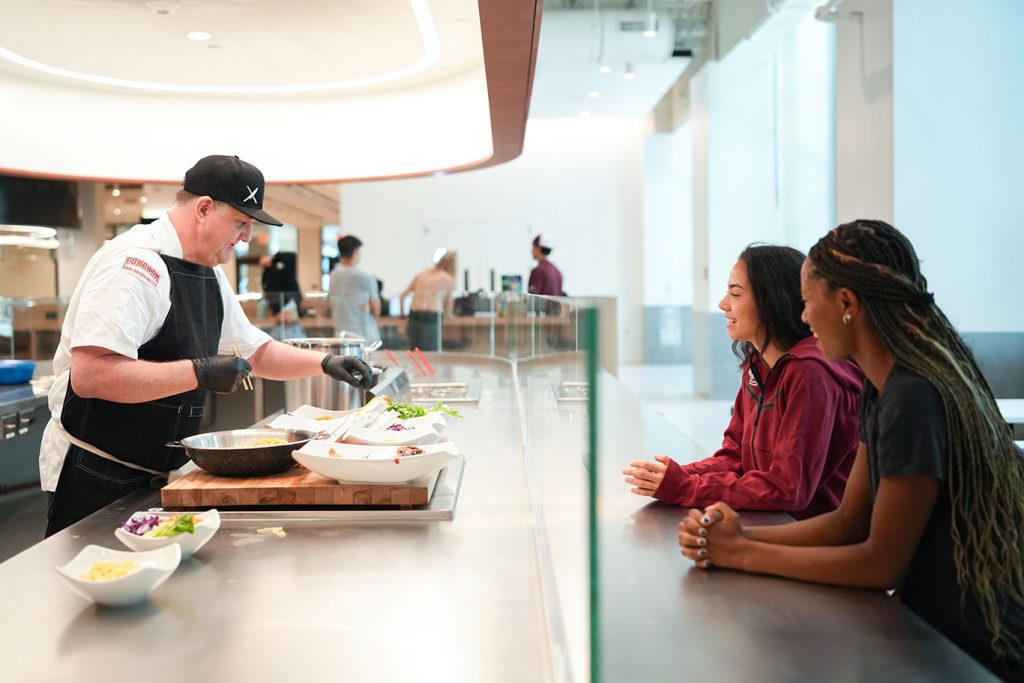
Starting Off Fresh
The first station that visitors encounter upon entering, the vegetarian and vegan station, sets the tone for the new space. Just as supermarket customers are greeted by aisles of fresh produce, Marketplace customers will be greeted by everything they need to put together delicious plant-based dishes. The dishes are part of a commitment to help Fordham lower its carbon footprint by using ingredients that have a low impact on the environment.
In recent years, “students are really gravitating towards more plant-based options,” Yaun said. “It’s a statement of freshness that the station is making that is carried through the whole facility.”
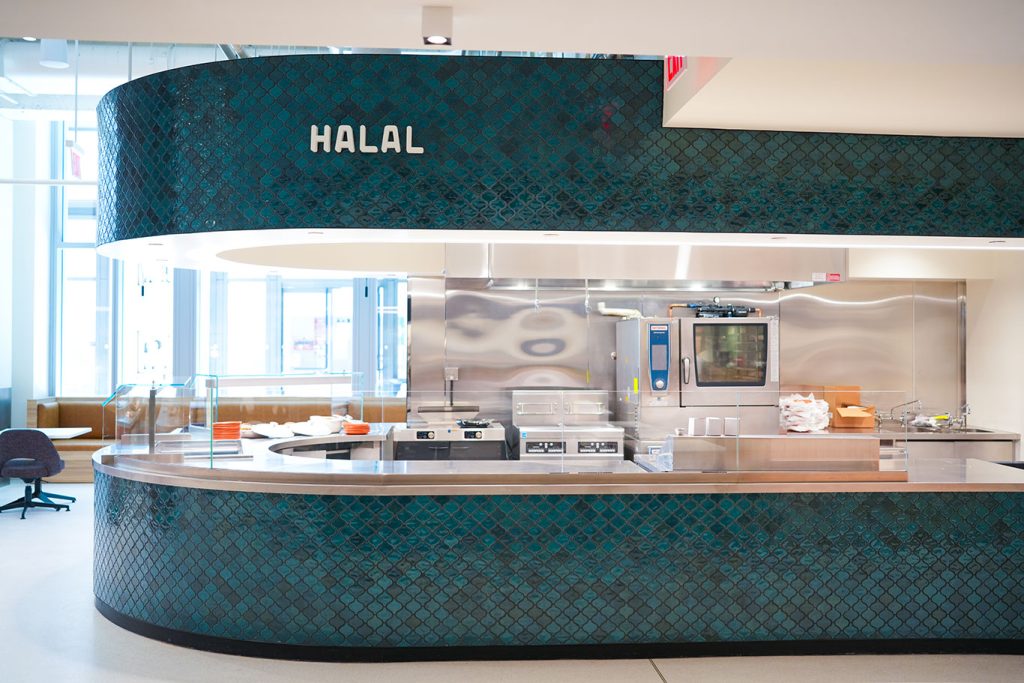
Space For Everyone
Seating arrangements are diverse: booths, tall tables, long tables, and benches are situated throughout, welcoming everyone from single diners looking to work through lunch to big groups gathering for a communal meal. One dining room can be sectioned off for private gatherings. Altogether, the space can accommodate nearly 800 diners.
One addition that foodies will want to keep an eye on is the Chef’s Table. The space will serve as a hub for cooking demonstrations and a place for chefs to share their experimental dishes.
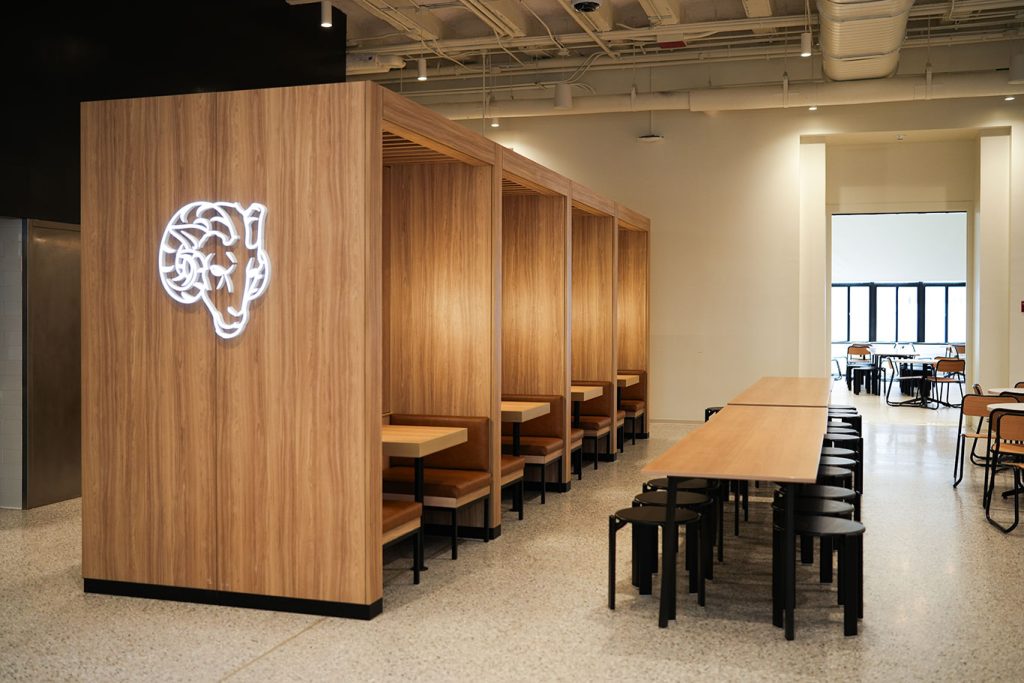
A Place to Refuel and Relax
Audrey Hayes, a senior at Fordham College at Rose Hill who got an early tour of the space as part of a student group, said she was eager to try the fresh pasta. She said she could see herself grabbing a booth by the entrance.
“When I study, I like to have a little bit of noise, so I find myself studying in the cafe sometimes,” she said.
Andres Perez, also a senior at Fordham College at Rose Hill, was excited to see a table big enough that the baseball team could use for a post-practice gathering. Perez, who pitches for the Rams, was intrigued by the halal station, where he’ll be able to get chicken and rice with a salad.
“It’s nice that it’s going to be an everyday option now,” he said.
James Serruto, FCRH ’24, who was chairman of the United Student Government Facilities and Dining Committee last year, said that transparency of food preparation was a big concern for students, who met with administrators weekly while the Marketplace was under construction.
He likes that the space will create opportunities for students to get to know the kitchen staff.
“It’s very easy to go over to the chicken fingers and fries, but when you know that somebody’s preparing a steak in front of you or preparing a healthy salad, it builds a sense of trust and understanding,” he said.
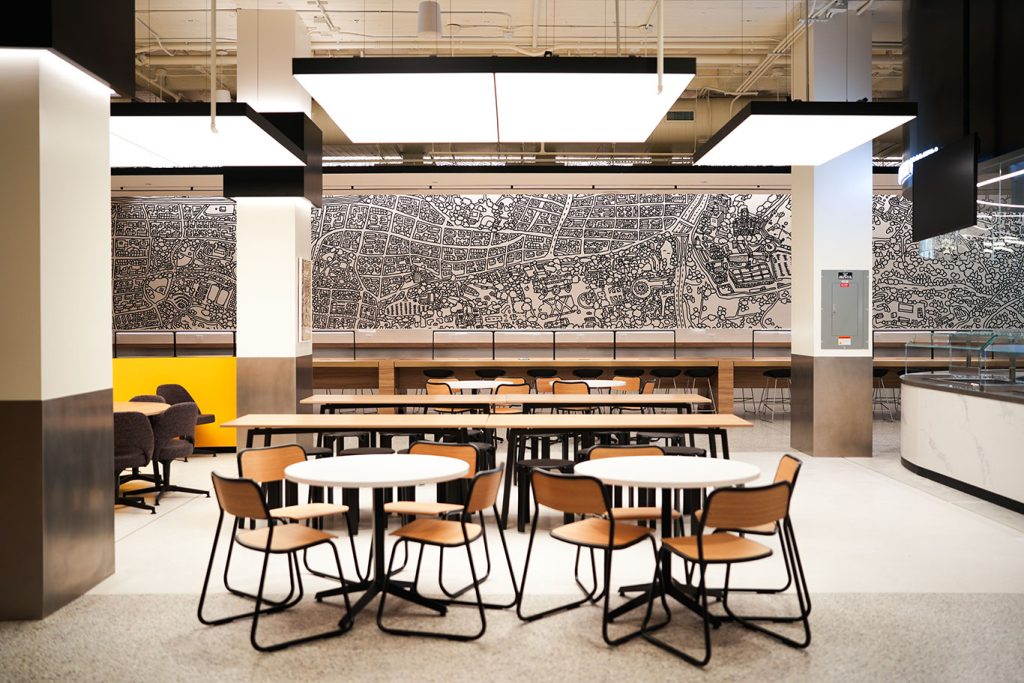
This piece was updated on September 30.
]]>“That richness of thought and perspectives really helps our work,” Jonathan Valenti, FCLC ’98, a principal with Deloitte Consulting, told Fordham College at Lincoln Center students in February.
Last fall, Fordham continued the conversation with students by hosting its first-ever Humanities Day, on September 19. “We all know that today, the humanities are under siege in virtually every university in this country,” Brenna Moore, Ph.D., a professor of theology, said at the event. “The logic seems to be we need a stripped down, efficient society. … Today we gather to push back on this pernicious logic.”
Moore is a member of the Fordham Humanities Consortium, which aims to “help our students flourish as they choose majors that seem increasingly countercultural.” The new group organized the Humanities Day gathering in partnership with Fordham’s Career Center. More than 100 students gathered in the McShane Campus Center at Rose Hill to hear from alumni and faculty about the value of studying philosophy, history, and other humanities fields.
In an article for The Chronicle of Higher Education, Martha C. Nussbaum, a professor in the philosophy department and the law school at the University of Chicago, described one of the less tangible benefits she observed while guest lecturing in a required philosophy course at Utah Valley University.
“What I saw was joy,” she wrote of the spirited debate that followed her lecture. “The sort of joy the philosopher Seneca described: not the flighty joy of the partygoer, but a solid inner joy that comes from discovering yourself.”
For Justin Foley, FCRH ’95, GABELLI ’03, who double majored in urban studies and philosophy, it was about learning to think creatively and being open to new paths, which is how he went from working as a tenant organizer to earning a Fordham M.B.A. to becoming a program organizer for the Service Employees International Union.
“Nobody said, ‘Here’s what your career track is going to be,’” he said. “I really learned to indulge my curiosity about the world around me. … My undergrad time has given me a framework for my values.”
—Franco Giacomarra, FCLC ’19, and Adam Kaufman, FCLC ’08
Why did you study the humanities, and what has the experience done for you personally and professionally? Tell us at [email protected].
]]>







It was a new ambience for the Joseph M. McShane, S.J. Campus Center: eerie music, wolf howls, ghoulish costumes, giant cobwebs, a hallway-size haunted house, laughter mixed with the occasional frightful yelp.
The one flaw in the spookiness? All that natural light flooding in through the huge windows. “The sun is always shining in, it’s beautiful,” said Gabriel Chavarria, a Fordham College at Rose Hill senior passing through the Career Center and Campus Ministry areas.
The Haunted Open House marked a new effort to help fully integrate the McShane Center into University life by enticing students to wander the full length of the second floor, discovering the cavernous hallways and hangout areas along the way—as well as all the offices there to serve them.
The second floor’s Halloween-season transformation highlighted a much larger, permanent transformation of student life brought about by the campus center’s construction, a pillar of the University’s $350 million fundraising campaign, Cura Personalis | For Every Fordham Student.
Enhancing the Entire Student Experience
Construction on the campus center has continued since it opened to students last year. Amid the second-floor Halloween hijinks on Oct. 17, crews were working on the first-floor Marketplace renovation that will produce a vastly better dining experience in another nine months or so.
Unfinished as it is, the McShane Center already feels like students’ home. “This is such a huge resource, and I think it’s a real asset to the University,” said Isabella Guariniello, a junior at Fordham College at Rose Hill who found the haunted house to be “a really cool way to interact with the students and the faculty here.”
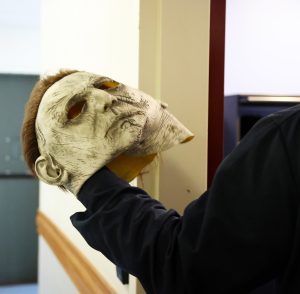
Commuter student Ryan Nole, a Gabelli School of Business junior, appreciates being able to hang out in the campus center between classes. He’s noticed that it’s brought new visibility to student clubs and organizations and provides a kind of social lubricant—“I know if I want to see someone, they’ll probably be here,” he said while checking out the open house. “It definitely fulfills its role as a community space.”
In fact, with so many students gravitating toward the new student lounge and communal spaces on the first floor, “we wanted another way for students to kind of say, ‘Hey, there’s more parts to the building, there’s a whole bunch of stuff up here,’” said Juan Carlos Matos, assistant vice president for student affairs for diversity and inclusion—dressed up for the occasion as “Dr. Acula.”
Students partook of Halloween candy—including the allergy-free kind—and activities like pumpkin painting. All of the second-floor offices got into the act, including Student Services, the Office for Student Involvement, and the Office of Multicultural Affairs.
‘Cathedral-Like’ Light
To be sure, the new campus center has already been boosting the work of second-floor offices including the Career Center, which gained a new suite equipped with 10 interview rooms, event space, and other amenities, including new capabilities to promote career-related events.
The new suite “has truly elevated our office University-wide,” said Annette McLaughlin, director of the Career Center. The 840 career counseling appointments held from July through September represent a 24 percent increase over the same period last year, she noted.
Campus Ministry and the Center for Community Engaged Learning, or CCEL, now share a roomy, inviting suite with floor-to-ceiling windows providing “cathedral-like” light, in the words of Campus Ministry administrator Carol Gibney. It offers plenty of room for students to study or hang out and unwind, making it more likely that they’ll learn about something they want to get involved in, said Amanda Caputo, FCRH ’23, a program manager with Global Outreach. “Students [have]made this their home, in a way,” she said.
By providing generous, dedicated space for CCEL’s meetings with its New York City partner organizations, the facility “demonstrates the University’s commitment to community engagement and experiential learning,” said the center’s executive director, Julie Gafney, Ph.D.
“It helps to show that this is what we mean when we say we’re a Catholic and Jesuit institution,” she said. “We mean that we create spaces that put our mission work first.”
Learn more about the McShane Campus Center renewal and opportunities to give in support of it.
]]>The grant, which comes from the Higher Education Capital Match Program (HECap), is the second one of its kind that the University has received for the Campus Center.
It will help fund the ongoing transformation of what has become a vibrant hub for the Rose Hill campus since it opened last year.
The Heartbeat of Campus Life
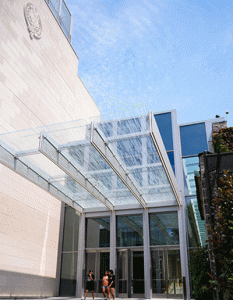
The center, which nearly doubled in size when the 71,000-square-foot addition was finished in February 2022, features multiple spaces dedicated to making the campus a welcoming place for all.
A first-floor lounge features a pool table and plenty of couches and chairs for relaxing, while the ground floor has additional spaces to gather, recharge, and exercise in a state-of-the-art 20,000-square-foot fitness center.
The upper floors are occupied by the offices of Career Services and the Center for Community-Engaged Learning, while a light-filled arcade that opened in August makes for seamless traveling to the athletic facilities. The building is also designed to LEED Silver level specifications, with triple-glazed windows, automatic lighting controls, recycled materials, and, in a first for the Rose Hill campus, heat recovery mechanical ventilation wheels, which reuse the building’s heat in cooler months.
Dining in the Age of Customization
When the new Marketplace opens in the fall, it will feature nine different stations, covering cuisine ranging from halal, deli, and grill to pizza, salad, vegan, allergen-friendly, and dessert.
One of the most dramatic changes will be the way dishes will be prepared directly in front of customers.
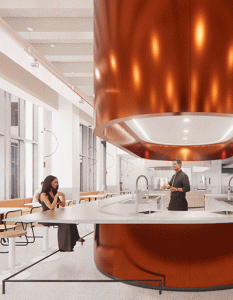
As an example, Deming Yaun, university dining contract liaison, noted that at the vegan/vegetarian station, the centerpiece will be a large, oval kitchen stocked with ingredients that are washed, prepped, and cut as needed for every dish, some of which will be sent to decks of ovens in a nearby kitchen to be “finished off” and returned. The Halal/Za’atar kitchen, for instance, will feature dishes such as Mansaf-stewed lamb with yogurt and mint, salmon in fig leaves, and grilled beef and lamb skewers, all prepared in the open.
This allows for customized dining that students expect.
“Over the years, we have been moving food preparation into or as close to the serving area as possible, but this takes it to a whole new level,” he said.
A Hub For Community
The new Marketplace space will be more than just a place for sustenance. Michelle Burris, interim vice president for student affairs, said she expects it will become as much a locus of activity as the rest of the Campus Center.
“We refer to the McShane Center as almost the living room of our campus where students can gather,” she said. “A fully renovated Marketplace is going to make it even more of a destination for students not only to eat but to be in community with one another.”
Lesley Massiah-Arthur, associate vice president of the Office of Government Relations and Urban Affairs and special assistant to the president, said community building was key to winning the grant, which was awarded in September.
Massiah-Arthur, the author of the grant application, said a grant of this size is only distributed to projects that benefit the broader public.
“I was thinking about how the University was coming back from the pandemic, and I started to think about the importance of food and dining together,” she said.
As such, Massiah-Arthur cited not only an academic study that showed the benefits of communal dining but also highlighted how a dining facility will make it easier for Fordham to host outside groups for gatherings where food will be served. Next year, for example, the Bronx District Attorney’s office will be hosting a two-day forum at the Campus Center with other U.S. Attorneys General on gun violence prevention.
“Being able to open up the University again is essential to who we are not only as a university but as an anchor institution for the region,” she said.
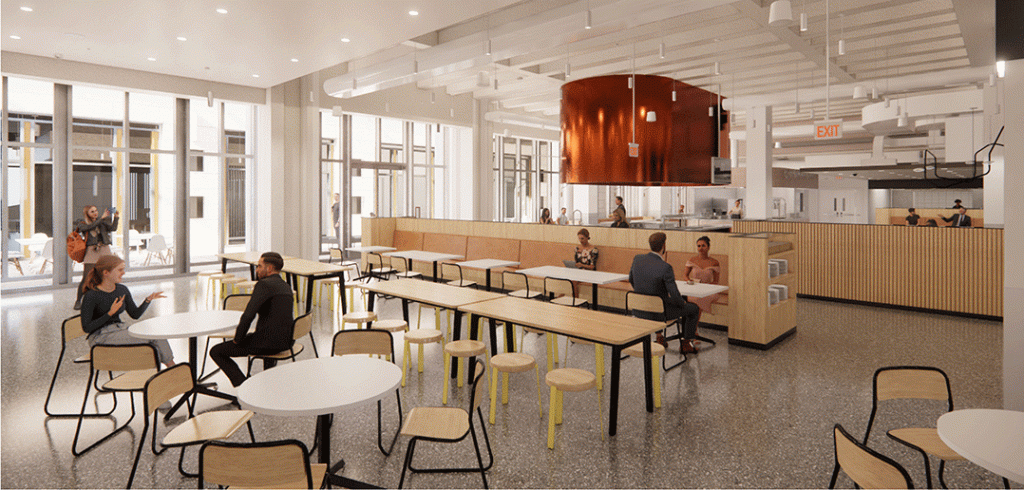
Benefiting the Environment and Local Economy
Even before it opens, the renovation will have a positive economic impact on the Bronx. It will generate approximately 250 union jobs over the course of the contract, and 25% of those jobs will be filled by local businesses.
The university will also work with local businesses to implement a new waste management system. All disposable containers will be fully compostable, and working with Bronx-based businesses to meet its composting goals, Fordham will divert approximately 230,670 pounds of food waste a year from landfills.
Where Friendships Form
Ben Medeiros, FCRH ’22, a student in the mental health counseling program at the Graduate School of Education, was commuting to the Rose Hill campus when the McShane Center opened last year. It was just long enough a walk that he preferred to stay on campus between classes.
“I didn’t want to walk home every day after class. I thought, ‘Let me just chill here before my next club meeting.’ You want to get out of your dorm room or your apartment and sit there,” he said. “I made better friends there than I ever did anywhere else.”
—Additional reporting by Chris Gosier.
]]>